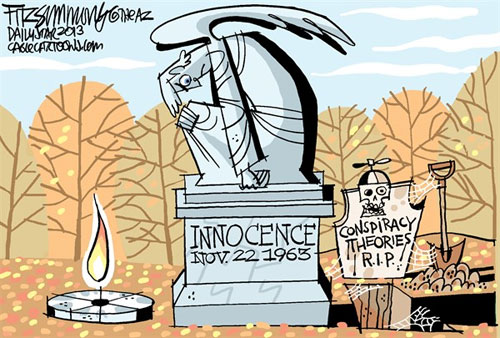
The Fifties Ended on November 22, 1963By Doug Patton November 21, 2013
The 1929 Wall Street crash would not be fully felt for a few years, thereby carrying much of the "roaring twenties" into the next decade. The deprivation of the Great Depression lingered well into the 1940s as America was forced to gear up for and win World War II. And because that war put everything else on hold for most Americans, the forties didn't really end for many people until Elvis Presley introduced Rock-and-Roll to a publicly reserved generation in the mid-1950s.
All one has to do is watch the first two seasons of the historically accurate AMC program "Mad Men" to see that even in cutting-edge New York City, the period from 1960 to 1963 was still solidly grounded in the 1950s. The World War II generation was in charge, men still wore hats with their suits, and even though the civil rights battles that began in the 1950s were still boiling across the south at the time of JFK's death, the legislation that would attempt to deal with those problems was yet to come. And The Beatles were still three months away from their first appearance on The Ed Sullivan Show, thereby replacing the American doo-wop groups that had dominated the music of the fifties. I was a 15-year-old sophomore at Abraham Lincoln High School in Council Bluffs, Iowa, on November 22, 1963. Like most Americans alive at the time, I remember exactly where I was when I heard the news. I was walking down the hall between classes when someone said, "Hey, Kennedy got shot!" I recall it so clearly because of where my mind went at that moment. Army Reserve Officers' Training Corps (ROTC) was a required course for all boys in our high school, and I shared that class with a kid named "Kennedy." My first thought was that he had somehow been shot with one of the World War II surplus M1 Garand rifles we were regularly required to disassemble and reassemble in ROTC class. In the last 50 years, I have often thought about the thought process that led me to that inference, and I have concluded that, like so many other Americans, I simply could not wrap my young mind around the truth. Once I realized what had actually happened, I immediately thought of my dad, who was an editor at the Council Bluffs Nonpareil. Curious about the day's events, and how it would be handled by a local daily newspaper, after school that day I walked the four blocks to the building where he worked. Understandably, it was a madhouse. The smoke-filled newsroom was teeming with young male reporters in white shirts, dark, loosened ties and rolled up sleeves, scurrying around my dad's desk. It was at that moment that I realized what he really did for a living. I had grown up watching him cover news events, first as a reporter and later as an editor, but for me it had all been an abstract exercise prior to that moment. And even though my own life's work would not exactly parallel his, the similarities, in journalism and in politics, are such that, looking back, I now realize it was then that I knew I wanted to be a writer. Camelot was a myth created by Jackie and by an adoring national media. Had John F. Kennedy not been frozen in time by an assassin's bullet in Dallas that day, he probably would not be remembered with anywhere near the adulation with which we view him today. But for those of us old enough to remember when we first heard the news, it was the day the carefree simplicity of the fifties ended and the complicated turmoil of the sixties began.
© 2013 by Doug Patton, Doug Patton describes himself as a recovering political speechwriter who agrees with himself more often than not. Now working as a freelance writer, his weekly columns are syndicated exclusively by Cagle Cartoons newspaper syndicate. For info on using this column at your publication or website, email Cart Dawson Bartley at cari@cagle.com. Astute supporters and inane detractors alike are encouraged to email him with their pithy comments at dpatton@cagle.com.
This column has been edited by the author. Representations of fact and opinions are solely those of the author.
Publish A Letter in SitNews Read Letters/Opinions
|
||
 JFK
JFK